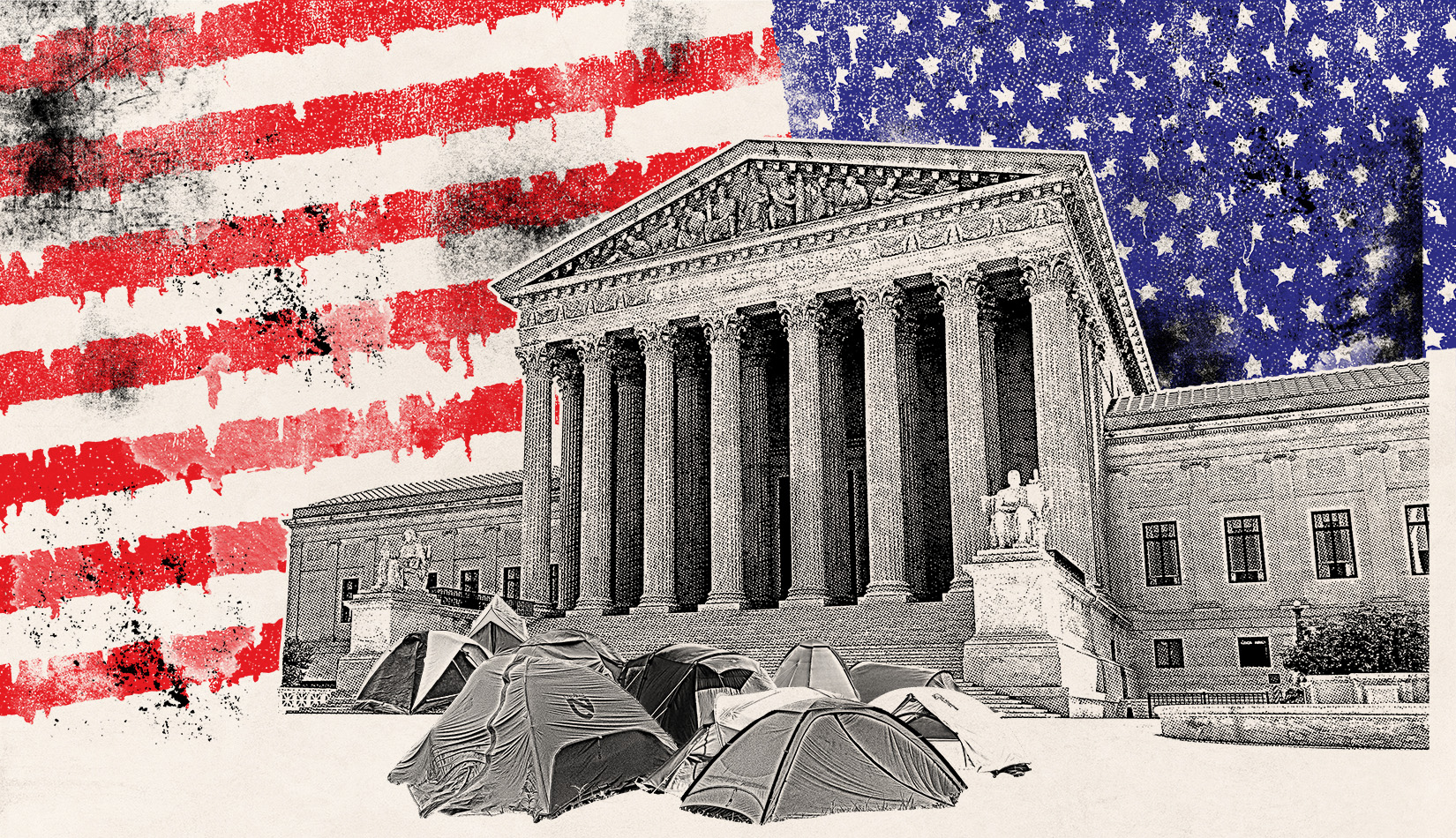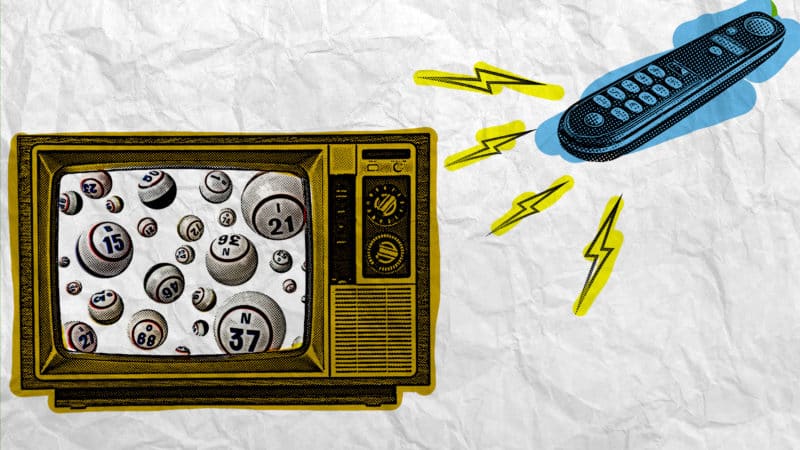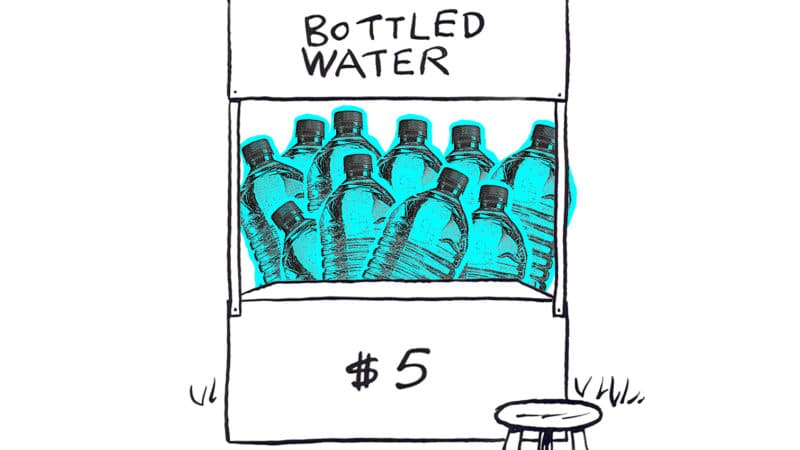The Supreme Court has decided fines and jail-time for sleeping outside when there is a camping ban is not cruel and and unusual punishment, paving the way for Florida’s own state-wide ban on camping.
A recent Supreme Court ruling has overturned precedent that stopped municipalities from punishing unhoused people when no shelter was available, paving the way for Florida’s own statewide camping ban even though many cities lack the housing they need.
In June, the Supreme Court ruled in Johnson v. Grants Pass that camping bans don’t constitute cruel or unusual punishment, which is unconstitutional under the Eighth Amendment. The case was decided on a 6-3 vote.
The plaintiffs in the case, which has been in the court system for more than a year, argued that a municipal ordinance in Grants Pass, Oregon, prohibiting camping on public property unfairly targeted people experiencing homelessness. City officials argued that the ordinance was necessary to control growing encampments, protect private property and address public health concerns.
In the majority opinion, Justice Neil Gorsuch argued that solutions for homelessness should be left to state and local governments.
“Homelessness is complex,” Gorsuch wrote. “Its causes are many. So may be the public policy responses required to address it.”
The ruling overturns previous legal precedent, set in Martin v. Boise that prevented cities from criminalizing the conduct of people who are “involuntarily homeless” and determined camping bans were cruel and unusual punishment unless shelter was available.
Advocates for housing solutions were quick to condemn the ruling.
Florida Rep. Anna Eskamani, D-Orlando, released a statement calling the ruling devastating and saying it doesn’t address the reality of homelessness.
“We will continue to do what we can at a local and state level to push back against the criminalization of our fellow Americans who deserve evidence-based interventions, not incarceration,” Eskamani said. “We will also advocate for additional dollars to be allocated toward both homelessness and long-term housing affordability projects.”
The National Homelessness Law Center, in a statement, called the ruling disappointing and said it will make homelessness worse.
“Arresting or fining people for trying to survive is expensive, counterproductive, and cruel,” the statement said. “Cities are now even more empowered to neglect proven housing-based solutions and to arrest or fine those with no choice but to sleep outdoors.”
That reality will be far more likely in Florida following the passage of a state law in March that prohibits local governments from allowing camping or sleeping on public property, effective Oct. 1.
IMPACT IN FLORIDA
Florida’s law gives businesses and residents the power to hold municipalities accountable through civil lawsuits if people are found sleeping outside while there is shelter space. The solution given in the law is a legal mechanism for municipalities — towns, cities, counties — to create designated camping areas on municipal land for up to one year, requiring bathrooms, running water and substance abuse and mental health services be available. The space must be approved by the Florida Department of Children and Families.
Florida Rep. Sam Garrison, R-Fleming Island, who helped spearhead the law, praised the court ruling in a statement to the Tallahassee Democrat.
“Today’s United States Supreme Court ruling is a victory for common sense and judicial restraint,” Garrison said. “Florida has chosen to reject comfortable inaction and tackle this problem head on. That is our right, and our obligation.”
Antonia Fasanelli, the Executive Director of the National Homelessness Law Center, disagrees that the law will tackle homelessness. She told the Homeless Voice that the law is attempting to create “internment camps” for unhoused people.
“It’s a very poorly thought out law and it’s a very harmful and aggressive law,” Fasanelli said. “And ultimately what it does is it penalizes people who have done nothing wrong simply because they live their lives in public spaces. And the elected officials don’t want that to be seen anymore.”
Fasanelli also questioned whether it will be possible for municipalities to meet all of the requirements laid out in the law, particularly under the fall deadline.
“In the logistics, they’re not even sure where land would be for these internment camps to be based,” she said. “So it seems quite unlikely that by the effective date of Oct. 1 that they’re going to be able to do what they need to do in order to comply with it.”
Martha Are, CEO of the Homeless Services Network of Central Florida, echoed Fasanelli in an email to the Homeless Voice, saying she worries that the two and half months to October isn’t enough time for counties to develop more sleeping arrangements, including the “much less desirable option of sanctioned encampments outlined in the law, which some Central Florida counties have taken a stand against.”
“Without options, though, counties are now backed into a corner in which they may feel forced to arrest our unsheltered neighbors to avoid being subject to lawsuits, as HB 1365 allows,” Are said.
The camps proposed in law often only create more problems and not solutions, she continued.
“The history of such camps is fraught with problems – including sharp increases in emergency calls to police and EMS, the mixing of vulnerable populations, and exposure to extreme heat, thunderstorms and hurricanes,” Are said.
CONSEQUENCES OF CRIMINALIZATION
Already the looming ban has pushed Mary Stewart out of Florida. A Homeless Voice contributor and Boca Raton native who has been homeless on and off for almost 20 years, Stewart said she left her home state and moved to South Carolina because she didn’t see any other options.
“I just couldn’t afford to stay in Florida, and I couldn’t get the help that I needed, and now being homeless is about to be illegal,” she said.
She told the Homeless Voice that she worries about being in and out of jail, leading her to lose her belongings and incur fines and a criminal record.
“You’re scared to go to sleep because you’re scared to wake up in cuffs just for sleeping,” she said. “That’s what my big concern is.”
Stewart also worries the law gives people and businesses a renewed incentive to call the police on people who are unhoused because they might be able to sue and get a payout.
Stewart said the law only hurts the people it claims to help by adding more barriers to finding housing and a job.
In areas without adequate shelter, Stewart said people may be forced to stay in abusive relationships or unsafe homes to avoid being arrested. Other possibilities Stewart predicts are more people turning to the health care system for hospital stays and an increase in crime.
NEXT STEPS
Local efforts to comply with the law are scattered.
The City of Orlando has set aside $4 million for a low-barrier emergency shelter, but hasn’t decided on a location yet, according to the Orlando Sentinel.
Other governments, like the Highlands County commissioners, are still working to figure out the potential impacts of the law and how much investment will be needed. County Attorney Sherry Sutphen told the commissioners in April that she is putting a plan together.
As one of the 29 counties falling under the legal definition of “fiscally constrained” identified in the law, Highlands County would be exempt from needing to offer health services, bathrooms or security at camping areas.
In Pinellas County, the Tampa Bay Times reported that the sheriff’s office is tracking the locations of unhoused people and compiling a list with the help of the Clearwater, Tarpon Springs, Pinellas Park and Gulfport police departments.
A spokesperson for the sheriff’s office told the Times that officers and social workers are using the list to approach homeless people to educate them and provide them with legal options.
Local advocates worry that it will be used to target people when the law goes into effect.
Are, with the Homeless Services Network of Central Florida, said that arresting people will never solve homelessness.
“Not only are arrests cruel, but they also slow down a return to housing by saddling people with fines and criminal records,” she said. “In the interim, they also cost taxpayers by increasing law-enforcement duties, public defender costs and jail expenditures.”
Florida’s looming anti-camping ban deadline and the Supreme Court ruling also coincides with a rising number of unhoused people in the state.
The Homeless Services Network of Central Florida’s Point-In-Time Count from January identified nearly 1,100 unsheltered people across Orange, Osceola and Seminole counties – almost double the number counted last year.
Last year also saw Florida accounting for 5% of the country’s unhoused population at 30,756 people.
Are said the best solution to homelessness is to tackle the issue of affordable housing and lack of supply.
“We know the great majority of the people you see on our streets were last housed in our neighborhoods,” she said. “Rather than arrest them, we must build the infrastructure to keep pace with the needs of our fast-growing community, and the state of Florida needs to support the development of safe and dignified housing options.”



